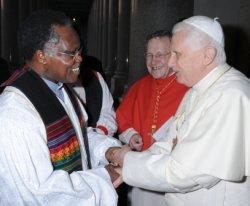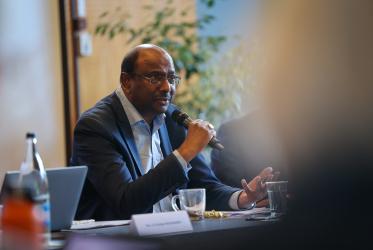At today's ecumenical Vespers service presided by Pope Benedict XVI, World Council of Churches (WCC) general secretary Rev. Dr Samuel Kobia underlined the importance of "a church that is one and united in its witness" to a world marked by violence and disunity. The service in Rome marked the conclusion of the 100th anniversary of the Week of Prayer for Christian Unity.
Earlier in the day, Kobia along with the members of the Joint Working Group between the Roman Catholic Church and the WCC were received in a private audience by the Pope.
At that opportunity, Benedict expressed gratitude to God for "the fruits of the ecumenical movement, in which we can discern the presence of the Holy Spirit fostering the growth of all Christ's followers in unity of faith, hope and love". He also praised the "fruitful ecumenical relationship" between the Roman Catholic Church and the WCC. Kobia affirmed the role of prayer as "the spiritual foundation of all efforts that led to the ecumenical movement and the achievements of the past" as well as the need to take forward the ecumenical endeavour "in a prayerful mode".
Kobia also met representatives of WCC member churches and of the Protestant Federation of Churches in Italy. The conversation focused on the issue of spirituality in an age of secularization, as well as on the current ecumenical situation in Italy, where the Protestant churches are determined to maintain a full and frank dialogue. "I am very interested in your views, since your churches are the eyes and ears of the WCC in Italy", Kobia said.
In an interview published today in the Vatican newspaper L'Osservatore Romano, Kobia shared his vision that the ecumenical movement would reach, by the mid-21st century "a level of unity such that Christians everywhere regardless of their confessional affiliations, can pray and worship together and feel welcome to share in the Lord's Table at every church". Such an example of unity, he continues, might "help humanity to overcome all divisions", so that the people of the world would "be able to live together in peace and harmony regardless of their backgrounds and identities."
More information on the Week of prayer for Christian unity
Feature: Praying together for Christian unity throughout a century of changes







